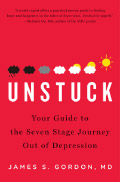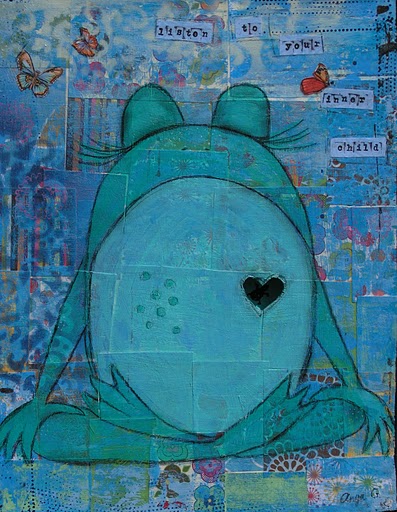 I try to make it a policy on Beyond Blue to publish the responses of authors when I write about their books. I very much appreciate Dr. Gordon taking the time to respond to me about his book “Unstuck: Your Guide to the Seven-Stage Journey Out of Depression,” so here it is …
I try to make it a policy on Beyond Blue to publish the responses of authors when I write about their books. I very much appreciate Dr. Gordon taking the time to respond to me about his book “Unstuck: Your Guide to the Seven-Stage Journey Out of Depression,” so here it is …
Dear Ms. Borchard,
I would like to correct a few misconceptions about my book, ‘Unstuck: Your Guide to the Seven-Stage Journey Out of Depression,’ profiled in the Newsweek interview you describe. The paragraph you quote does not accurately represent the message of ‘Unstuck’, and I hope to set the record straight.
1. Depression is a grave and widespread problem and I never suggest that it isn’t. But the perception of it as a disease, and one that can be simply and easily cured by a simple note on the prescription pad, is not only dangerous, it’s disrespectful to the complex suffering that people are experiencing and to the capacity of each person to mobilize and heal him- or herself.
2. I do not state that stopping use of SSRI’s is the right choice for everyone; I make the distinction that SSRI’s are not useful for the majority of people with mild to moderate depression, and that these people might be better served with a self-care regimen before, or while, trying SSRI’s.
Several recent studies have found that in cases of mild to moderate depression, SSRI’s are no better than placebo, and SSRI’s have many more negative side effects than any of the techniques described in Unstuck. In fact, as I describe in the book’s introduction, SSRI’s may in some cases be quite harmful, as several studies find increased risk of suicidal thoughts and behavior while taking them, and others have demonstrated significant neurological damage.
3. I recommend that people who are on SSRI’s DO NOT stop taking them without reliable professional guidance and/or social support, and only when they have a number of techniques and a support system to depend on in place. Only with this kind of support should they attempt to face the unpleasant side effects of the withdrawal that is euphemistically called “discontinuation syndrome.”
On this note, one of your commenters wrote, “I know for a fact that what I have isn’t something I can make go away with JUST meditation, yoga, and nutrition.”
–She may well be right. One of my first recommendations is for someone to find guidance and support for themselves while they are on the journey, whether that is a professional guide, and/or sympathetic family and friends. Together with this guide, it may be possible to create a comprehensive regimen–perhaps with and perhaps without medication–that helps her to move through her depression.
4. I would also like to point out that when you wrote . . . .
‘In the morning I meditated and prayed at a special spot on Back Creek. In the afternoon, I swam with a new swimming buddy who challenged me big-time with a set of intervals, I walked around the picturesque grounds of the Naval Academy, and then I asked Eric to cut out of work early so that we could go kayaking along the Severn River.’
. . You are using at least 4-5 of the activities I prescribe in my book. The fact that you are using them in conjunction with medication does not weaken their power, and sounds like it is working for you in your particular situation.
I am glad you have found a treatment program that works for you. It is my intention with Unstuck to help many more people find ways to live through, and learn from, depression, whether or not they continue to take antidepressant medication.

